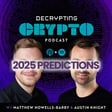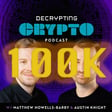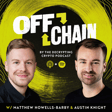Become a Creator today!Start creating today - Share your story with the world!
Start for free
00:00:00
00:00:01

The Fed is Dovish, While Strategy Remains Bullish
In this week's episode we cover yesterday's Fed meeting and rate decision, discuss the macro outlook, dig into the pump.fun vs Raydium battle within Solana, and explain Strategy's recent STRF issuance.
Transcript
Introduction & Market Sentiment
00:00:12
Speaker
Hello and welcome to the Decrypting Crypto Podcast. It's March 20th, 2025, and this is Off-Chain, your weekly recap of the biggest stories in the crypto space. I'm Matthew Housebarby, and as always, I'm here with my co-host, Austin. How are things?
00:00:28
Speaker
Doing all
Fed Rate Decision & Market Recovery Expectations
00:00:29
Speaker
right, Matt. ah We continue the sideways action with a little bit of, I guess, positivity the last day or so. How are you feeling? Don't don't count your chickens.
00:00:40
Speaker
Yeah, we're kind of crab walking around right now, aren't we? um It's, do you know what? Actually, I'm i'm quite positive. ah that Maybe it's because the sun is shining in in London for for the first time in a very, very long time. And, you know, I've opened up a window for for the first time in a very long time. It's it's ah it's quite novel.
00:01:05
Speaker
Maybe it's got me feeling all bullish. um But no, I think that, and we'll talk a little bit about the Fed rate decision ah ah very shortly.
00:01:16
Speaker
But...
Analysis of Dovish Fed Meeting
00:01:19
Speaker
I think we're starting to get a handle on the chaos. Not that there's not going to be more chaos. I think that markets have responded and responded pretty aggressively to the chaos.
00:01:31
Speaker
And yeah i just don't feel... what While the bottom may not fully be in, I don't think we're far away from it. um And the Fed meeting yesterday...
00:01:46
Speaker
was a lot more dovish than I actually thought it would be. And I think there's some interesting stuff that we can pull pull out from that. But overall, you know, things things are good. And... um I think for crypto, there's still a lot of really positive news outside of just the the
Market Volatility and Trading Advice
00:02:08
Speaker
wider markets. But yeah, it's it's a place where I'm sure lots of people have been getting chopped up, and chopped to pieces trying to trade this. It reminds me actually in a very different setup, um similar to August of last year, where people were getting cut to pieces, where we were having these like,
00:02:27
Speaker
10% swings up, down, up, down. Terrible place to be going leverage long um on stuff. So yeah, it feels a bit like ah just step away. Step away from the charts and trade less and you'll probably come out as we we move through the second half this year into a much better spot.
00:02:52
Speaker
So yeah, long positive. Yeah.
Fed's Growth and Inflation Forecasts
00:02:56
Speaker
Well, with that, why don't we we jump into the first story of the day because we're going to talk a little bit about ah the ah Fed discussion yesterday as well as a whole host of of other things. let's Let's jump right in now.
00:03:16
Speaker
So we had the March Fed meeting. I think no real surprises there, Austin, that they chose to keep rates steady.
00:03:26
Speaker
I think it was pretty much a complete lock-in. um But what everyone was paying... attention to, him myself included, were was the commentary around this.
00:03:40
Speaker
And ah I think the market's trying to figure out, I was i mean, I was looking at the S&P futures this morning and It's been really bizarre watching the market over the past pretty much 10 days where it's been like two days of gains, two days of losses, two days of gains, two days of losses. It's just like being driven by mild amounts of news. um But what the what the Fed said and what Jay Powell said is that they...
00:04:13
Speaker
First of all, have they've slashed their US growth forecasts pretty dramatically actually. They're only expecting GDP to increase 1.7% this year. That's a big reduction.
00:04:26
Speaker
um At the same time, they've upped their inflation estimates by 2.7% this year. how However, what I think is interesting about this is you say, okay, well, they think that inflation is going to be worse than anticipated.
00:04:46
Speaker
ah So initially when I saw this headline, I was like, oh God, all right, this is gonna basically mean we're real long-term wait and see mode. And it sounded a face value, somewhat hawkish.
00:05:01
Speaker
All of the discussion really around the major area concerns that I was hearing from Jay Powell were around US economic growth. and a lot of concern around that.
00:05:13
Speaker
Why is that
Inflation: Transitory or Not?
00:05:14
Speaker
important? Well, they care more about the the risk of declining growth than they do the risk of inflation, much more likely to see easing ah when it comes to to rate cuts and action being taken there.
00:05:27
Speaker
um But what am I talking about, right? that They're still saying that inflation is going to go up much more than anticipated. Well, I don't know, Austin, if you heard the word that Jay Powell used. And I literally, I had to, i I had to like read, I was watching like um one of the summary clips from the Financial Times and I had to pause it and take it back to the moment where Jay Powell said the word transitory.
00:05:56
Speaker
yeah i I was like, what 2022, 2023 in that January period? And it was just like, is it transitory? Yes, we believe that inflation is transitory. They stuck to the transitory inflation.
00:06:10
Speaker
And it's literally been the biggest criticism of the the Fed that they got wrong through the post-COVID inflation cycle. I honestly couldn't believe that he used that word again.
00:06:21
Speaker
It's just there's so much stigma around it. However... In amongst my kind of shock, as I hear him talking about this, this is where I thought it it was interesting, is he explicitly talked about the ah increase in inflation expectations through 2025. And then actually, they believe that in 2026, like the the the inflation forecast kind of remaining the same, it's going to go down.
00:06:50
Speaker
um and explicitly said tariff-based inflation and non-tariff-based inflation. They said basically, this is not verbatim, but close to it the lion's share of the increase in inflation expectations we believe are going to come from tariff inflation.
00:07:11
Speaker
And we believe this tariff inflation to be transitory. And for any of you that either haven't been listening to me and Austin talk about Fed meetings in the past, or haven't been following a lot of like the news cycle around this and in the early days of when we started to come out of the ah the COVID boom, what they're saying here is that you know this is a passing, this is temporary. It's a passing phase. and It's not sticky. We don't believe this is going to persist.
00:07:38
Speaker
It's from a temporary force that we believe is going to calm down. I don't know about you Austin, but that for me felt extremely dovish. And I personally now feel that we are going to see a rate cut in the first half of this year.
00:07:55
Speaker
um yeah and And I think a lot of at least the soft economic data that we're we're seeing is was already pointing towards that. is. Before this meeting, if someone said to me, rate cuts on the cards for April, I'd have said no way.
00:08:10
Speaker
Now I'm like, I still don't think it's going to happen, but it will it won't surprise me as much now. um Very interesting. Yeah, I mean, I think you're on to something there.
00:08:23
Speaker
um We know that
00:08:27
Speaker
Like, I think a big part of what Trump is is trying to there's multiple things he's trying to accomplish here. But one of the things is that he's trying to refinance the U.S. national debt, um because right now we're we're making high interest payments on our national debt that are i like eclipsing entire government department budgets.
00:08:47
Speaker
um And the only way to ah you know refinance that debt at a better rate is for rates to go down.
Political Influences in Economic Strategies
00:08:56
Speaker
um You would think that in order for that to happen, there there does have to be some kind of a at least temporary cooling of the markets.
00:09:06
Speaker
um And there has to be some type of a little bit of a rough transitionary period to force more capital out of equities and into bonds to help drive the rate down.
00:09:22
Speaker
if that If that is what's happening, then this could be a period that makes a lot more sense in hindsight. And then you also consider the fact that Jerome Powell is wanting to separate out these two forms of inflation, tariff inflation versus non-tariff inflation. I mean, certainly tariff inflation I think is either much more in our control or is something that will potentially in the future be positioned as being offset by some other form of economic growth. Like if Trump were to successfully onshore a ton of manufacturing, for example, um you know, you would see markets rip like crazy um if if there were like real signs of that plan actually starting to work.
00:10:10
Speaker
So um um this is I think this actually is a wait and see. like It is. i don't I don't know how they're going to separate. I also don't know how they're actually going to separate tariff inflation, non-tariff inflation. And Jay Powell conceded that they're figuring that piece out.
00:10:29
Speaker
It's really hard to see. But you know I think we were we were talking about this in maybe the last episode when we really were talking a lot about the big impact of like the the the market scare from tariffs. and you know, tariffs are inflationary categorically.
00:10:47
Speaker
The question is, where are they inflationary? Right. And that's the big question. I don't think anyone can debate that they are inflationary. They are by nature, a tariff that increases the price of something is who's absorbing that cost.
00:11:00
Speaker
And what I thought was interesting, I don't know if you saw the most recent ah Canada um inflation data rising quite a lot more than expected.
00:11:12
Speaker
um We don't want to drive too much derive too much from from that, but um if the the tariffs are being absorbed um by you know the tariffed country as much more than or as much as you know the ah the country that is placing the tariffs, then you're going to see a much bigger effect on the tariffed country.
00:11:36
Speaker
And I don't think it's going to be like... either that or this ah for every single tariff. it's It's going to be very different depending on the the supply chain, et cetera. But um I think the Fed very reasonably have to do a bit of wait and see.
00:11:51
Speaker
But I get the feeling that they're not going to hang around too long because they are very much worried about the US economy. And um I just i can't see them holding off too long. they were And we've talked about this before when we were at the beginning last year of the rate cutting cycle right through the summer.
00:12:17
Speaker
We talked about how the Fed were late to introduce rate hikes right at the beginning of inflation, right now, 2022, 2023.
00:12:28
Speaker
they do not want to be late in the easing cycle. And I think they probably were a little bit early actually, and have paused a bit, but I i don't think they want to let this go on too long um because there's no way that Trump's taken the rap for um economic recession.
00:12:48
Speaker
Right? and Yeah. um I saw some, I think
Economic Shifts Amid Tariffs
00:12:52
Speaker
he posted out a truth ah yesterday pushing for J-Pow very explicitly to reduce rates in April off the back of some of this. So, yeah, you know, it's interesting, like just a few anecdotes. One anecdote that I have regularly referred to ah for the last several years is like, what is it like to purchase a house?
00:13:15
Speaker
you know, and I'm in a Sunbelt state, we build like crazy in, you know, Texas, Florida, Georgia, Alabama, all Arizona, whatever. All of these, um these states with like low, low regulations around building residential real estate, um they will build, build, build supply to meet demand. And so when there is an off balance, and you see, you know, the the price of of a home, ah getting somewhere close to like,
00:13:43
Speaker
six, seven, eight, 10, 14 times the the median income of of the area, you know you start to get really concerned. um What I'm seeing on the ground here in Austin, Texas, is that most of that has dissipated.
00:13:56
Speaker
ah Rent rates have gone down significantly, um but the cost to build or buy a home has also gone down significantly. My dad... um has been looking to build a home here since September of 2020. This is how long of a process this has been. It's part of what's kept me close to it.
00:14:14
Speaker
It's been one of the crazier real estate markets. One of the crazier markets, for sure. And it doesn't you know the rest of the country doesn't necessarily behave like this, but um it is an indicator, i think.
00:14:28
Speaker
ah you know In September of 2020, he got a quote to build a home. It was X number. ah Three months later, that number had doubled. Six months later, it had tripled.
00:14:39
Speaker
um Now we're about 10% above the original number ah from September of 2020. Yeah. ah so you know Take that for what it's worth.
00:14:50
Speaker
um yeah that I think that the a ah I'm starting to feel more comfortable about like where where the real cost of living is right now, which, you know as i've as I've said time and time again, it makes me uncomfortable to cut rates.
00:15:07
Speaker
And to juice equities when the real cost of living is still too high, you know. um So I'm sure that that's something that economists much more intelligent than I are paying attention to.
00:15:19
Speaker
The other thing is on the tariffs, another sort of like real ah anecdote. um um buy I like buy and sell a lot of t-shirts. ah There's this company called Printify, which is like a big time t-shirt printer basically. yeah And um I recently- think have the European equivalent is like Printful.
00:15:39
Speaker
I think that they're also- Printful actually is another company that I use. Yeah. So I recently got emails from both of them um saying, hey, just so you know, ah we won't be increasing prices at all as a result of tariffs. Yeah.
00:15:55
Speaker
um Similarly, i yesterday I was looking at, this is so niche, but just to make the point, I was looking at bow thrusters and thirdn stern thrusters for a boat. Just a classic Monday that is, isn't it? first For you. These are basically like- Did you buy the super yacht?
00:16:13
Speaker
Oh man, I wish. So these are like these intricate little motors that go on the the front and rear of a boat to kind of if it's a large enough boat, you need to have these motors that directionally push it from side to side so that you don't lose control when you're docking or going into a slip or something like that.
00:16:32
Speaker
But they're really complex, expensive little pieces of technology because they're a small package that produce a lot of thrust. I can't imagine that much of that technology is being sourced from the United States at all.
00:16:48
Speaker
um And yet, you know, right there on the site, there's this big message that's like, prices are not changing as a result of tariffs. Now, my econ 101 brain flips on there and I'm like, bullshit.
00:17:01
Speaker
Like, you're just basically going to say that and like absorb the cost for some time and then there will be a quiet price increase that like nobody knows. Kind of like the Black Friday sale that comes one week after the price increase, right? Yeah. Yeah, I mean, those costs have to be absorbed somewhere.
00:17:20
Speaker
um Nevertheless, it it is a really interesting thing that once again, going back to wait and see that, like, I am ready to wait and see how this plays out, you know, because there are different schools of thought here, like some, some people saying, Hey, we just have a trade deficit that we need to fix. And that will offset the tariffs. And, you know, if you onshore manufacturing that offsets the tariffs with economic growth, et cetera, et cetera.
00:17:44
Speaker
Hey, let, let's see if that actually happens. Yeah, I mean, there's a lot of ifs. um And ah ah so much of this is very interconnected. I mean, we talk about where is the inflation of tariffs going to be absorbed.
00:17:57
Speaker
I don't want to make this like a whole nother tariff episode, but there's a lot of economic issues. set up that can influence this. right You talk about companies that are right now, at least, eating that cost. So where is the where is the inflation being felt? Where it's being felt by the the companies and they're not passing that to the consumer.
00:18:21
Speaker
yeah in In worsening economic conditions, ah if the companies are being squeezed, they have less access to capital due to high rates or it's more expensive and they're struggling, they may not be able to absorb those costs and they will maybe need to eventually pass those on.
00:18:38
Speaker
At the same time, the US is in this tricky situation. tricky zone where consumers are showing signs that they're worn out from price increases and actually they're not necessarily willing to pay the extra.
00:18:53
Speaker
And I think, with you know, i think like the whole egg Price inflation was like a great example of some of this. And we're seeing this in in retail sales across a lot of the earnings of the, I guess, um larger retail um companies across the US as well.
00:19:13
Speaker
that's That's where I think a lot of the US economic worries come from. So it's going to be a delicate bacing balancing act. Why is this important for
US Debt Strategies & Crypto Markets
00:19:20
Speaker
crypto? Well, I think, you know, the Clearly, there's a huge focus on reducing the US debt burden, as we've talked about.
00:19:28
Speaker
And I think when you look at where the majority of that US government debt lies, it's in kind of like the the middle of the curve. So those like medium to long dated bonds and bringing down the 10-year yield is going to be actually one of the most beneficial pieces for like the between the five and 10-year yield.
00:19:47
Speaker
It's going to be one of the most beneficial areas for driving down the cost of that debt. um So rate reductions there would definitely be very, very positive. I think Trump also is clearly, or at least Besant, is trying to drive down the ah the price of the dollar, which up until maybe couple of weeks ago has done a pretty successful job of. um I think mortgage rates raised in the US for the first time in like 11 weeks or something like that. So you know you're going to have that, but it's a few of those different numbers are going down. i just think...
00:20:20
Speaker
if we get more and more economic data that's looking poor, it seems like the Fed is just waiting now to to pull the trigger. yeah um And the market's still still put ah baking in two rate cuts.
00:20:32
Speaker
um So we'll see. We'll see how it all plays out for sure. All right, let's jump over into a slightly different topic. um I got a real quick story because I think this there's something interesting happening over in the Solana ecosystem.
Solana Ecosystem Growth
00:20:47
Speaker
So um Anyone listening that's been even remotely paying attention to, ah meme coins over the past, say three, six months will be familiar with pump fun. The, uh, the, the, the platform for minting new, uh, meme coins basically is what has been driven, driving this like explosion of, of meme coins.
00:21:14
Speaker
Um, now. There's been a very like positive flywheel, if we just don't opine on whether meme coins are positive or not, within the Solana ecosystem and a lot of the big players that have been happening that's that's been happening around PumpFun over you know the past six six to nine months where...
00:21:34
Speaker
PumpFun doesn't actually have like an AMM. It doesn't have like a DEX in it. ah So you can mint new tokens and then they're traded using the liquidity of like the big AMMs in Solana, like Radium, which, you know, i think in the past 30 days, um somewhere in the region of 40% of all of the volume that's done on Radium um is from PumpFun tokens.
00:22:00
Speaker
And i while I haven't looked at the data going back to January, I imagine it's probably closer to like 80%. So, you know, Radium um has relied heavily on this for their trading fees.
00:22:13
Speaker
And that's where most of the cash comes from. um Radium has been around for a long, long time. Well, well established player. And and Clearly, where the majority of all liquidity runs through in the Solana ecosystem.
00:22:30
Speaker
Well, POMFAR announced, think about a month ago, that they were building their own AMM, which puts a bit of a wrench in the works for the likes of Radium because it's going to cannibalize their biggest source of of trading fees. And think off the back of that, their RAID token nosedived after appreciating quite a lot.
00:22:51
Speaker
um I think for pump fund users, know they probably don't many of them don't know that you know they're trading via radium, it's obfuscated. So the transition to trading via um the but baked in ah liquidity that could be built into pump fund is like, it's probably just if anything, assuming liquidity is there, ah going to be ah just a normal transition experience it would be seamless. But for pump fund,
00:23:18
Speaker
now They'll absorb ton more of the of the three of the fees by just kind of vertically integrating up the stack. Well, Radium have just come out and so that they're building a pump fund.
00:23:33
Speaker
And this this does feel very much like a sink or swim situation. i mean Okay, it's maybe a bit hyperbolic. but um they they are they're launching um it's called launch lab um and i think this is their attempt to try and recapture some of this i i i think like when you think about the the ability to capture that share.
00:24:01
Speaker
i think it's infinitely harder to capture people at like the token creation stage. It's a bit more about like the UX and getting people to actually visit Radium and go mint tokens on it versus, you know, pump fun going and just integrating an AMM into it so that you can just trade on the same platform that you already were going to for minting. So I'm going to have to do something much bigger to capture more of that market share. But I just have this feeling that things are going to really shake up in Solana if the market starts to pick up and we see another explosion in meme coins.
00:24:42
Speaker
And if all of like the, if the liquidity gets fragmented quite a lot across Solana, because it's been so, so dominant within Radium and um and now also Meteora, that we may see more and more competitors coming into this this space. I just think it's going to be an interesting shakeup in and of the Solana DeFi ah ecosystem, which is a little bit insular in in the way it operates as well. So we'll see how that plays out.
00:25:11
Speaker
This feels like um and NFT marketplace wars. Agreed. It does, yeah. I agree with that, actually. because you know and And actually, even stuff that we've seen with like some of the standalone apps like Moonshot that really took off over the end of last year and stuff.
00:25:32
Speaker
they're they're They're very just UX focused, you know, they're obfuscating a lot of the tech behind it. you're I doubt your average pump fund user is really paying too much attention to the liquidity mechanics, etc. behind this. so um They're paying way more attention to the meme.
00:25:52
Speaker
Exactly, exactly. And so it's it's definitely gonna shake up, but i agree. i think what we'll probably start to see ah is, and and you mentioned the NFT marketplace wars,
00:26:06
Speaker
a ton of big incentives kind of being pushed out, you know, strap yourself in for the pump fun points program and everything else that's coming. um I'm pretty certain if they're launching a decks, I know a lot of people disagree that they would do this, but I strongly believe that pump fun is going to launch a token alongside this and ah Radium will have to respond ah to to that as well. So yeah, strap yourself in. If you're in in the Solana ecosystem, you're interested in some of the space, I think going to heat up quite a lot.
00:26:38
Speaker
um And we we should see, hopefully what comes out of this is something useful. ah so But we will see.
00:26:49
Speaker
All right, what did we why don't we jump into our ah last story,
MicroStrategy's Bitcoin Investments
00:26:53
Speaker
Austin? You were gonna talk a little bit about our favorite man, ah Michael Saylor, right? Let's do it.
00:27:04
Speaker
No, it is not a story about SBF getting reprimanded in prison for doing an interview with Tucker Carlson. They put him in the hole.
00:27:16
Speaker
Oh, man. When pardon. When pardon. Oh, God. it it It would be funnier if it wasn't actually a genuine possibility for something like that to happen.
00:27:30
Speaker
Yeah, SPF is no longer. our favorite man, Michael Saylor is. So oh yeah, MicroStrategy, they're at it again. They are embarking on another significant round of Bitcoin purchases. This week, MicroStrategy announced that they purchased an additional $10.7 million dollars worth of Bitcoin, about 130 Bitcoins.
00:27:52
Speaker
And that also- Austin, also they're on the next evolution of MicroStrategy. They are no longer micro, right? They have grown- in in size, stature, and basically just name.
00:28:05
Speaker
we We now have much edgier strategy. The brand designers in there were having probably a field day on the on the rebrand, I'm sure. Yeah, and now they are STRK.
00:28:17
Speaker
on the NASDAQ, I guess. um So yeah, I guess that's a little confusing. um But I think that the reason that they're doing that is because they're they're trying to get away from like their historical business and emphasize more this like broad, you know,
00:28:34
Speaker
crypto approach. um And they are demonstrating that in their corporate financial strategy as well, because that purchase of $10.7 million dollars worth of Bitcoin was funded by selling 123,000 shares of their 8% Series A preferred stock, um which generated the capital required without issuing any new Class A common stock.
00:29:00
Speaker
And when they purchased these 130 Bitcoin, prices were in a pretty tight range of about seventy six k to So of that acquisition happened. last week so most of that acquisition happened when Bitcoin was around 83K, I think that they said like the the median ah purchase price was like 82.7 or something like that. So- um Much smaller buy though than usual, other in some of the more recent ones, which in fairness, you know, they were, you know,
00:29:34
Speaker
buying huge multiples of of this amount at the 100K mark. ah So yeah certainly that cost basis is going to come up on a lot of their purchases. I seem to remember going into the year of something like 60K or something, it must be much higher now.
00:29:52
Speaker
Yeah, that's right. um So, that that you know, $10.7 million dollars is a small purchase amount for what we've historically seen from strategy or from Michael Saylor.
00:30:04
Speaker
um But they have some big plans. And in fact, I believe I read that this this disclosed purchase of 10.7 million was um like the smallest purchase. um of the recent purchases that they are that they have done and that they are planning to do.
00:30:20
Speaker
They plan to purchase additional Bitcoin by issuing some 5 million shares of Series A Perpetual Strife preferd preferred stock. Jesus. Yeah. to This is an interesting one. This one is, I think. like Yeah. but They did like a they did a pub because they They haven't really done something like this before where it's like an actual futures kind of product.
00:30:46
Speaker
um So like, well, it's perp stock, right? So it has like no maturity date. The investors can kind of hold this indefinitely, but it has a pretty juicy dividend ah on it.
00:31:00
Speaker
That's right. Yeah. Yeah, so unlike a common stock, um a PERP does not grant voting rights, but it does pay fixed dividends. In this case, it's about 10% annually with quarterly payments in cash. And if those dividends are not paid on time, they actually accumulate at an increasing rate up to a maximum of 18% per year. So what this does- It's key one though. Here's a key thing, right? It's like, you talk about like, if dividends are not paid on time, like you you can only do that with a PERP.
00:31:32
Speaker
You have to pay dividends on time, regardless of whether you are a like performing badly, performing well with, um, with like non-pub stock, right?
00:31:44
Speaker
Uh, what this allows them to do is yeah. Anytime they can suspend dividend payments and albeit, like you say, know, uh, you'll accumulate more at a higher rate. So maybe you're not so fast, but Also, you might be wondering why are they suspending the dividend payments and getting a little bit nervous. but So there is a bit more risk, I think, from an investor perspective on this one.
00:32:10
Speaker
Yeah. It's like, are they trying to avoid the death spiral that we've always worried about, especially if you see, you know, Bitcoin going down, um it would be concerning, but what this does is it allows strategy to raise capital without diluting voting power for their common shareholders. And in fact,
00:32:29
Speaker
With those 5 million shares of PERP that they're issuing, they're looking to raise $500 million. dollars it's ah It's only a portion of of you know what they have invested into Bitcoin, but it's not a small amount of money. I mean, $500 million dollars of inflows or of purchases of Bitcoin, you know that is significant.
00:32:50
Speaker
That said, let's contextualize it. Their total Bitcoin handings to holdings today stand at about... half a million Bitcoin. It's 499,226 Bitcoin. is valued at $41.6 billion. So Matt, earlier were talking about their acquisition price. Those Bitcoin were acquired at average price $66,360 per Bitcoin.
00:33:09
Speaker
billion dollars they so matt earlier you were talking about their acquisition price those bitcoin were required at an average price of sixty six thousand three hundred sixty dollars per bitcoin And this makes them the largest corporate holder of Bitcoin, controlling more than 2% the fixed 21 million Bitcoin supply.
00:33:32
Speaker
That's huge. um I'm trying to remember how much BlackRock own. I'm sure they can't be that far. Let me let me chat GPT this while we're.
00:33:44
Speaker
ah How much Bitcoin does BlackRock own? Let's see what... Because I think they must be close. um Yeah, January 2024, they held 574,000 BTC. Okay.
00:33:58
Speaker
I guess they're an institutional investment trust. Right. It's not Yeah. five hundred and seventy four thousand ah btc so okay um i guess they're an institutional like and and that would be right because of state right like and's not is that a corporate Yeah, so that's like counting the ETF and everything, right? i mean that's That's basically the AUM of the iShares, the iBit, ah the Bitcoin Trust ETF. Yeah, so how much they, and that's also how much they they hold under custody as a result.
00:34:31
Speaker
But um yeah, MicroStrategy being like the largest corporate holder. um And I think as well- It is actually insane to think that MicroStrategy almost has one entire Bitcoin ETF under their control.
Risks of Corporate Bitcoin Holdings
00:34:50
Speaker
And the largest. I think there's a lot of misinformation about um um strategy and there their Bitcoin holdings and some of the risk. But you know even if you assumed this stuff is bulletproof,
00:35:13
Speaker
You have to say categori categorically, the single biggest risk to Bitcoin, I think, um is strategies holdings.
00:35:24
Speaker
Because at the end of the day, it's a corporation um that is a single entity that can fail. And we've talked about this before, like, you know, happens if a sale gets hit by a bus? um but What happens, like, with a leadership change, the...
00:35:43
Speaker
the the the the volatility that that could create. um this There's just a lot of unknowns, I think, that that can come into this. I don't love it um at all.
00:35:55
Speaker
ah This is a central point. and it's ah Did you say it was 2.2% of the supply, something like that? two Yeah, so somewhere around 2%. yeah Yeah, it's, it's a lot and they, you know, they're only gonna continue to grow it.
00:36:10
Speaker
Um, so it's yeah, as much as it, you know, does a good job of pumping bags of BTC, they are the largest hodler and you have to respect it.
00:36:20
Speaker
Um, it's, I mean, do you remember Matt, like at the ah FTX collapse, just, you know, sort of like off the top of the head here, um I think the claims were that they had like one to 200,000 Bitcoin. about right.
00:36:37
Speaker
Tied up in that collapse. I don't know what, what the end number was, but.
00:36:44
Speaker
Yeah. yeah You know, if, uh, I just, you know, something I always wonder about is imagine working in the software division of strategy.
00:36:56
Speaker
Yeah. but a weird What a weird place that must be to to work. Like, you literally don't ever hear Michael Saylor talk about, like, the software business. I think they do, like, something like $100 million in revenue or something. Maybe even less ah from, like, the this software business. It's, you know, i don't think it's...
00:37:18
Speaker
um I don't think it's EBITDA positive on the actual like the the actual underlying business itself. So yeah it's it's crazy. um But look, I mean, they they they hold all of these BTC. They can generate a fantastic like ongoing yield through lending and otherwise off of this. So...
00:37:42
Speaker
so I don't think they're going to struggle to create revenue. I just still find it so funny that it's still like this actual just random software business. Yeah, I know. It seems like maybe they're going to be moving away from that.
00:37:57
Speaker
Yeah, I think it's a matter of time. And I think now that regulation has ah really started to shift with like um the Saab 121, on ah one twenty one um just enabling corporations to hold Bitcoin on their balance sheet with less red tape and you know not having to hold one-to-one reserves across all of it and defeating the whole object of it.
00:38:23
Speaker
I think we will start to see a big, steady increase and then explosion of companies holding PTC. I mean, yeah, this is the last bull run when Tesla was where they bought like a billion dollars worth of Bitcoin or something like that. They held on their balance sheet. I'm trying to remember.
00:38:43
Speaker
yeah coin Yeah. Yeah. ah And I think Jack did it as well. If I seem to remember a block and a few others and now we're seeing
Future Economic Conditions & Market Impact
00:38:53
Speaker
it more and more.
00:38:53
Speaker
Yeah. And I thought, I thought also i i'm trying to remember the company, but I think the first company, um corporation ah put through like a structured plan for having eth comprise up their corporate treasury as well so it's like this is all starting to starting to come into place this can be very common that we start to see this a lot more now yeah all right man let's wrap it up i'm sure there's going to be a lot of um
00:39:27
Speaker
A lot of interesting macro stuff happening. I think for what it's worth, we we're going to continue to chop around for at least another few few weeks. I think things start to get interesting again in April, especially in the run up to the the the Fed decision. We'll see how some of the economic data comes out in the the the coming weeks. But yeah, stay tuned. um I'm feeling a lot more positive after this conversation as well. I love this positive, Matt.
00:39:57
Speaker
Abush mag. We're running it back, Austin. We're running it back. All right. Good talking to you, Austin. i' ah I'll see you next week. Yep. See you then.
00:40:27
Speaker
The contents of the Decrypting Crypto podcast should not be used and are not intended as investment advice. Please do your own due diligence before making any investment, cryptocurrency or otherwise.




![CBDCs: The [Dark] Future of Money (Part 2 of 2) image](https://media.zencastr.com/cdn-cgi/image/width=112,quality=85/image-files/61fc0461fb20e00040aeb09e/5b9f1396-2a8e-418d-82a0-30fd00969266.jpg)






